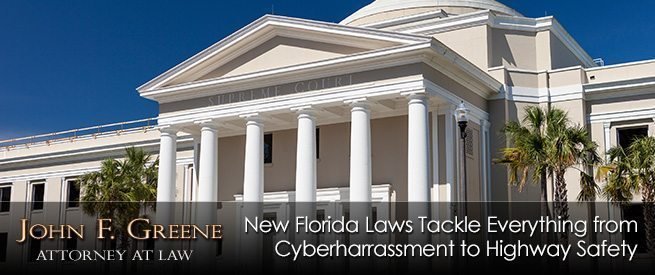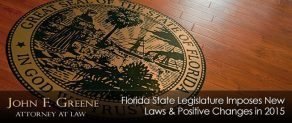
Florida’s new 25 laws effective in July 2015 cover a wide gamut of crimes. From sex trafficking and cyberharrassment to highway safety and more, these new laws are well-defined and targeted to curb crime in the state.
Prostitution and Human Trafficking
Those who solicit others to commit prostitution face increased criminal penalties under HB 465. No longer is this offense a second-degree misdemeanor; it is now a first-degree misdemeanor. And a second offense will be charged as a third-degree felony. Those conviction of these crimes will have to perform 100 hours of community service, take an educational program on the adverse effects of human trafficking and face a minimum of 60 days in prison. The judge can also impound the offender’s vehicle. Florida is hoping to crack down on prostitution and human trafficking with these stricter penalties. HB 469 and HB 467 protect the identity of human-trafficking victims from public records and hide the location of safe houses for victims of human trafficking.
Cyberharrassment
SB 538 makes it a first-degree misdemeanor to sexually cyberharrass a person by posting explicit images without a person’s consent. This type of cyberharrassment is also known as revenge porn, and the images do not have to include personal identification information.
Domestic Violence
When it comes to domestic violence, SB 342 makes it crystal clear that when a judge orders a “no contact” condition, the order is effective immediately and enforceable for the period of pretrial release. It also spells out that “no contact” condition includes contact electronically, via a phone or through a third party. This new measure is intended to enhance protection for domestic violence victims.
Highway Safety
HB 7055 covers a number of transportation-related changes. New measures are in force for golf carts. Golf carts can drive on two-lane county road when approved by the municipality and have an 18-inch red flag. Unlawfully displayed golf carts are now fined $500 for a violation instead of $100. Among other things, HB 7055 allows the Department of Highway Safety and Motor Vehicles to pay a maximum of $5,000 for the costs of funerals for police officers killed in the line of duty.
Health Care
Health-care surrogate law has been changed under HB 889. People can designate health-care surrogates to act on their behalf even when they are still able and competent to make decisions. At the same time, competent individuals can veto any decisions of the surrogates. This bill also allows legal guardians and parents of minors to name surrogates for the minors when they cannot be contacted in order to make timely medical decisions. It includes dental treatment and other types of medical treatment.
Law Enforcement
Under HB 197, it is now a second-degree misdemeanor for an individual to install a tracking device on another individual’s property without their consent. However, this measure does not apply to parents or guardians of disabled adults or the elderly and police officers during criminal investigations. HB 201 now requires the Florida Department of Law Enforcement to create an online training program for officers regarding diabetic emergencies. And SB 1010 makes it unlawful and illegal to impersonate an arson investigator or firefighter.
Governmental Accountability
The new Florida laws also affect public officials. HB 115 stipulates that public officials must make restitution when found abusing the power of their positions by performing 250 hours of community service. The new law requires that judges must make public officials accountable for their actions.
You need to consult with an experienced criminal defense attorney
If you need a consultation with a Florida criminal defense attorney, contact John F. Greene. He has 30 years of experience working with defendants charged or convicted of felonies and misdemeanors in both state and federal courts.
The law office of John F. Greene is located in Destin and serves all those along the Emerald Coast, specifically the City of Destin and all of the surrounding Okaloosa, Bay, and Walton Counties. Contact him online or call 850-424-6833 to schedule a consultation.









